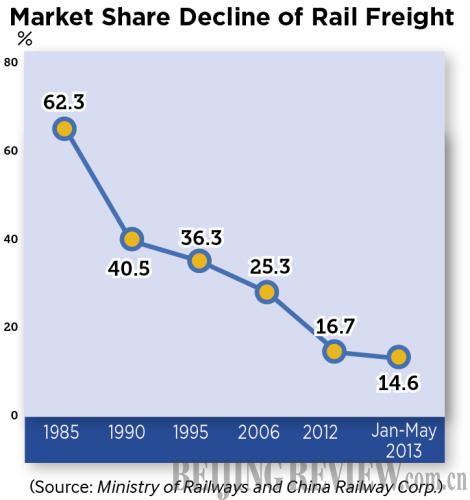|
Unless changes are made, railway transporters will inevitably lose their customers when competition in the transport market becomes increasingly fierce.
How to adapt to market demand and realize maximum economic benefits have become top concerns in the railway freight reforms.
Sheng Guangzu, General Manager of the CR, said at a conference on May 20 that he "hopes to ensure that profit targets are maintained under the new reforms."
Impacts
Shao Zhonglin, Deputy Secretary General of the China Express Association, told the media that the CR's freight reforms will have some impact on the country's logistics industry.
Chinese express companies usually adopt ground and air transport, Shao says. Railway transport accounts for a small proportion overall. Express companies are concerned about whether the new measures can solve three issues: Whether railway transport can satisfy the demand of delivery companies, whether goods can be delivered at any time of the day and whether the goods can be picked up conveniently.
The CR's reform measures have touched upon these issues. It has even begun to offer express services via high-speed railway. Small parcels will be transported on the first high-speed train of the day and will arrive on the same day or the following morning. Furthermore, compared with long distance transport by truck, railway transport can effectively reduce logistics costs and thus should have lower prices in the end, a major benefit to consumers. Additionally, Shao believes that rather than directly compete with each other, both road and railway transporters will work together to provide road-and-railway coordinated transport services that will benefit both industries.
Difficulties
With other reform measures across other industries, Zhao believes the changes specifically related to freight transport will involve a complicated struggle of competing interests.
At present, there are 18 local railway bureaus in China. All of them highly depend on the CR for train dispatching and income and have no ownership of their properties. Since they are unable to make commitments to prices and service quality, they are not true market participants.
Zhao thinks the reform of railway freight transport should first make clear the market position of transporters. He suggests an organizational structure should be established with the CR as the holding company and the 18 local railway bureaus be reorganized into three regional railway companies and become real market participants.
Zhao says that resistance from vested interest groups should not be underrated.
"The reform of railway freight transport is just a beginning, and there is still a long way to go before being completely market-oriented."
Email us at: lanxinzhen@bjreview.com

| 